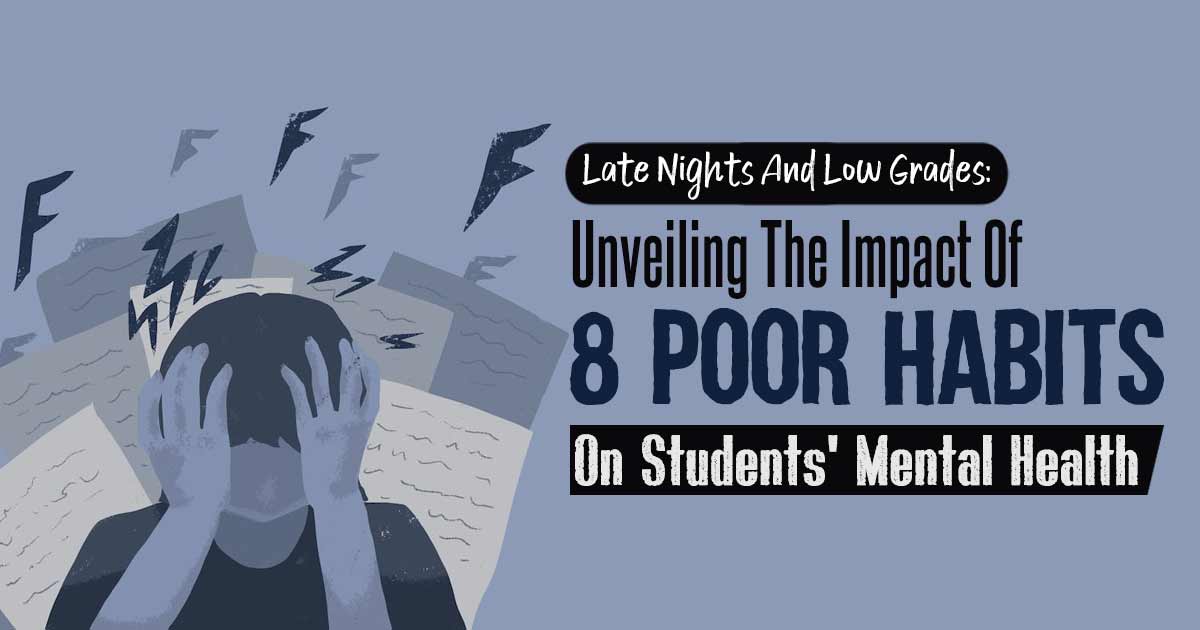To excel in school, students adopt different habits aimed at increasing their productivity and performance. Nevertheless, some innocuous student habits damage brain health, hindering cognitive functioning and learning. Research attributes these six common student habits that may potentially damage the brain and hinder academic success:
1. Inadequate Sleep:
Among students, one of the most common and destructive inclinations is poor sleep habitS. Students have found themselves compromising their sleeping hours to catch up with school work or go out with friends or engage in co-curricular activities. However, insufficient sleep has ramifications for mental abilities.
Many scientific studies have proved that sleep deprivation affects memory consolidation, learning and general cognitive performances negatively. Chronic loss of sleep impedes attention span, decreases problem-solving skills, and leaves one vulnerable to stress.
2. Excessive Caffeine Consumption
However popular as an instant tonic for tiredness, over-indulging in caffeine could have repercussions on brain health. As a result of needing to remain awake during late-night cramming sessions or when studying for exams etc., many students rely on caffeinated beverages such as coffee or energy drinks.
Nonetheless, too much taking of caffeine can lead to insomnia, increased anxiety levels, and impairment of cognitive ability. Furthermore, after short periods of feeling more alert than usual, one experiences an inevitable ‘crash’ which fuels dependence and triggers the risk of caffeine use disorder.
3. Procrastination
Brain health can be affected by procrastination – one habit some students find hard to break free from. On approaching deadlines while procrastinating, students experience heightened anxiety levels that trigger increased secretion of cortisol, a stress hormone. The hippocampus, which is responsible for memory and learning in the brain, can be destroyed by prolonged exposure to high levels of cortisol. Moreover, students who procrastinate often repeat negative habits that hinder their acquisition of effective time management skills.
4. Multi-tasking
With round the clock internet and social connections in place, many students are always multitasking such as chatting on social media while doing homework at the same time or listening to music while surfing the internet. Unfortunately, humans are not good at multitasking.
This means that when people try to do several things at once, their brains get divided among them—thereby reducing efficiency and worsening what would have been quality work. Furthermore, it has been discovered that chronic multitasking leads to reduced gray matter density in the anterior cingulate cortex (ACC) of the brain associated with decision-making and impulse control.
5. Sedentary Lifestyle
The demands of academic life often keep students sitting for too long in lecture halls, libraries, or desks. This sedentary lifestyle has been linked with a number of negative health outcomes, including impaired cognitive function.
Conversely, regular physical activity has been shown to improve cognitive performance, memory, and attention. For example, physical exercise promotes the release of neurotransmitters, such as dopamine and serotonin, that are necessary for mood regulation and cognitive function.
6. Unhealthy Dietary Choices
The connection between diet and the brain cannot be understated, yet many students fail to recognize how the things they eat can affect their minds. Consuming a diet high in processed foods, sugar, and saturated fats can contribute to inflammation and oxidative stress in the brain—thereby leading to possible cognitive decline. Furthermore, insufficient intake of essential nutrients like omega-3 fatty acids as well as vitamins and minerals may have negative effects on the functioning of the brain.
While striving for excellence in academics is noble, learners need to be cautious about how these student habits damage brain health and mental faculty. As they realize how harmful these habits can be, as well as take to deliberate efforts towards embracing alternative healthy options, it will ensure that student’s cerebral capacity is not only boosted but also shielded from future risks. Education isn’t just about knowledge acquisition; it must also strive to cultivate habits that support holistic well-being of an individual.



